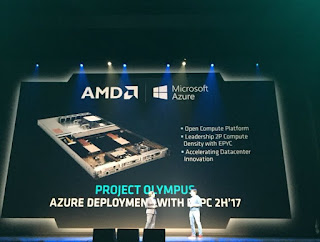Microsoft Azure Becomes First Global Cloud Provider to Deploy AMD EPYC™
— Microsoft’s Project Olympus Hardware Design Powered by the AMD EPYC
Processor Now Deployed in Azure —
— New L-Series Storage Instance Leverages Massive PCIe™ Connectivity and High Performance of AMD EPYC Processors —
 |
| Credits : Tom’s Hardware |
Singapore — December 8, 2017— AMD (NASDAQ: AMD) today announced the first public cloud instances powered by the AMD EPYC™ processor. Microsoft Azure has deployed AMD EPYC processors in its datacenters in advance of preview for its latest L-Series of Virtual Machines (VM) for storage optimized workloads. The Lv2 VM family will take advantage of the high-core count and connectivity support of the AMD EPYC processor.
“We are extremely excited to be partnering with Microsoft Azure to bring the power of AMD EPYC processors into their datacenter,” said Scott Aylor, corporate vice president and general manager of Enterprise Solutions. “There is tremendous opportunity for users to tap into the capabilities we can deliver across storage and other workloads through the combination of AMD EPYC processors on Azure. We look forward to the continued close collaboration with Microsoft Azure on future instances throughout 2018.”
Corey Sanders, director of compute, Microsoft Azure, Microsoft Corp, said, “We’re welcoming AMD’s new EPYC processor to Microsoft Azure with the next generation of our L-Series Virtual Machines. The new Lv2-Series are High I/O, dense storage offerings which make EPYC perfect for Azure customers’ demanding workloads. We’ve enjoyed a deep collaboration with AMD on our next generation open source cloud hardware design called Microsoft’s Project Olympus. We think Project Olympus will be the basis for future innovation between Microsoft and AMD, and we look forward to adding more instance types in the future benefiting from the core density, memory bandwidth and I/O capabilities of AMD EPYC processors.”
The Lv2-Series instances run on the AMD EPYC 7551 processor, featuring a base core frequency of 2.2 GHz and a maximum single-core turbo frequency of 3.0 GHz. With support for 128 lanes of PCIe connections per processor, AMD provides over 33 percent more connectivity than available two-socket solutions to address an unprecedented number of NVMe drives directly.
The Lv2 VMs will be available starting at eight and ranging to 64 vCPU sizes, with the largest size featuring direct access to 4TB of memory. These sizes will support Azure premium storage disks by default and will also support accelerated networking capabilities for the highest throughput of any cloud. With the unique capabilities enabled by AMD EPYC processors and Microsoft Azure, Lv2 is a perfect fit for storage-intensive workloads.
The Lv2-Series instances are based on Microsoft’s Project Olympus design, first introduced just over a year ago as Microsoft’s next generation hyperscale cloud hardware design. This groundbreaking design serves as a new model for open source hardware development with the Open Compute Project community.
Additional Resources
· AMD EPYC on AMD.com
· Follow AMD datacenter developments on Twitter @AMDServer
About AMD
For more than 45 years, AMD has driven innovation in high-performance computing, graphics and visualization technologies ― the building blocks for gaming, immersive platforms, and the datacenter. Hundreds of millions of consumers, leading Fortune 500 businesses and cutting-edge scientific research facilities around the world rely on AMD technology daily to improve how they live, work and play. AMD employees around the world are focused on building great products that push the boundaries of what is possible. For more information about how AMD is enabling today and inspiring tomorrow, visit the AMD (NASDAQ: AMD) website, blog, and Facebook and Twitter pages.
—30—
1The AMD EPYC processor supports up to 128 lanes of PCIe Gen 3 (both 1 socket and 2 socket configurations) on every product. The Intel Scalable Processor supports a maximum of 48 lanes of PCIe Gen 3 per CPU and 20 lanes in the I/O chip. (max of 68 lanes on 1 socket and 96 lanes on 2 socket) on all CPU’s.
AMD, the AMD Arrow logo, AMD EPYC, and combinations thereof, are trademarks of Advanced Micro Devices, Inc. Other names are for informational purposes only and may be trademarks of their respective owners.
For the LATEST tech updates,
FOLLOW us on our Twitter
LIKE us on our FaceBook
SUBSCRIBE to us on our YouTube Channel!





